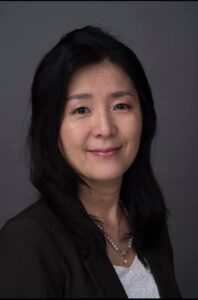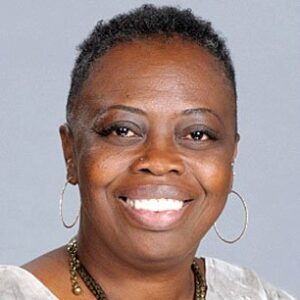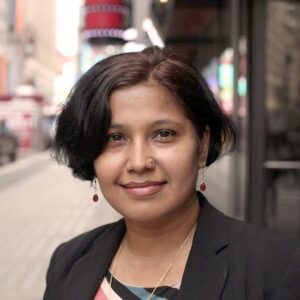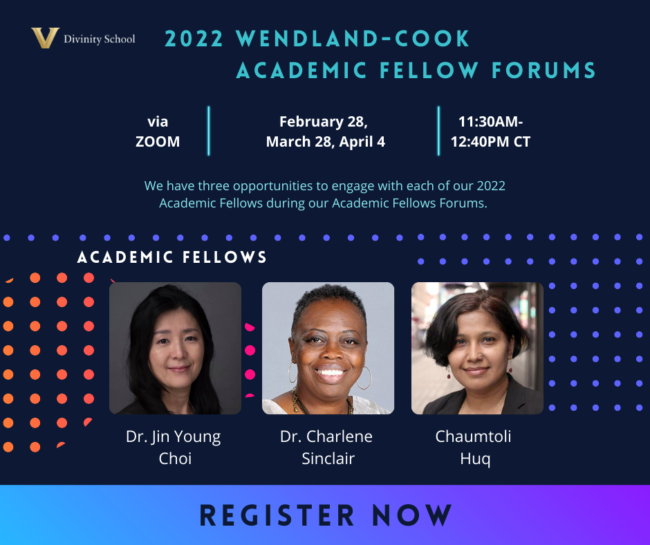Scholars of economic justice from varied disciplines expand on Wendland-Cook Program’s mission in Academic Fellows Forum
For the first time in its history, the Wendland-Cook Program in Religion and Justice has accepted three scholars into its year-long fellowship program, which focuses on matters relating to the intersections of religion, economic justice, class and labor, and environmental justice. The previous cohort in 2020 had a single fellow. During his fellowship, Jeremy Posadas, the John F. Anderson Chair of Christian Thought and associate professor of religious studies at Austin College, focused on how ecology and economics are linked, and the connections between what exploits the planet and what exploits people. This year’s three fellows are:
- Jin Young Choi, Baptist Missionary Training School Professor of New Testament and Christian Origins at Colgate Rochester Crozer Divinity School
- Chaumtoli Huq, associate professor of law at CUNY School of Law
- Charlene Sinclair, the founding director of the Center for Race, Religion, and Economic Democracy (C-RRED) and the program coordinator for the Interfaith Organizing Initiative
Sinclair and Huq are scheduled to give a free lecture via Zoom on March 28 and April 4, respectively, that is open to the public. Members of the public are encouraged to register for the lectures at the Wendland-Cook Program website.
The academic fellowship program provides fellows the support necessary for research and writing, and engagement with a community of scholars and students investigating matters of economic and ecological justice. Each successive cohort of fellows builds a broader professional network of scholars contributing work to this intersection of religion, economics, and ecology. The requirements for each fellow include: a written piece for Interventions, facilitating a training on the Exchanges platform, facilitating a discussion with Wendland-Cook Program student fellows at one of their weekly colloquies, and giving a public lecture on their research interest.

Choi’s February 28 public lecture, titled “Race, Political Economy, and Biblical Interpretation,” focused on using the intersection of race and economy to interpret the Bible and bring change to the discourse and discipline of biblical studies. She shared her reflections on what biblical and theological resources could be used to address issues of class, labor and economic justice. “Korean minjung theology, which emerged in the 1970s, argued that God is the God of the oppressed and Jesus sides with minjung, or ‘the masses.’ We see today’s minjung across the globe, from the Filipino nurses that have been disproportionately affected by COVID-19 to the 1.6 million Ukrainian women refugees,” Choi says.
“As a person of faith and a teacher-scholar, I’m committed to raising minoritized scholars’ voices in white-dominated biblical scholarship. When we approach intersectionality, we mainly focus on race and gender/sexuality. But I have found what is often missing is socioeconomic inequality in religious discourses or theological analyses,” says Choi, who is also an alumna of the Vanderbilt University Graduate Department of Religion (PhD ’13, MA ’10). As an immigrant from Korea, she is interested in how imperialism and white supremacy have been interconnected in the historical legacies of everything from settler colonialism to genocide to chattel slavery and segregation to the prison industrial complex.
All three 2021-2022 Wendland-Cook Academic Fellows are women. “We want to make it clear that whatever we do in this program is intersectional. It is always related to gender, ethnic, and sexual justice, considering the issue of labor is highly minoritized and affecting women in particular ways,” says Joerg Rieger, founding director of the Wendland-Cook Program, Distinguished Professor of Theology, and Cal Turner Chancellor’s Chair of Wesleyan Studies.
The fellowship program brings both academic research and community organizing together in a space that allows mutual learning between the fellows and Wendland-Cook Program researchers and students. Though the fellowship only lasts a year, Rieger says the goal of the fellowship program is to develop an ongoing relationship with all fellows that brings conversations about religion and economics or labor to arenas where they are less known.
“We need discourse on economics, class and labor in conjunction with the current questions about race and gender,” says Rieger. His forthcoming book, Theology in the Capitalocene: Ecology, Identity, Class, and Solidarity, argues that race and gender questions cannot be solved without simultaneously solving the economics question, and includes a concluding chapter on reparations.

Sinclair has worked since the 1980s on economic justice through community organizing, which led to investigating “why deeply impoverished and oppressed people work for justice, even at great risk to themselves.” Her lecture on March 28 will ask whether movements of resistance demanding justice in response to Black death are performing projects of justice while rearticulating and concealing systems of injustice and death.
“Whether it is biblical studies or the nature of God, these are also cultural and ideological questions that frame whether people move towards or against justice,” says Sinclair, who also serves as a lay minister at the AME Zion Church on the Hill in New York City. “People don’t give them the import that they ought to. We can’t talk about justice unless we align it with people’s beliefs about the nature of God and what God calls us to do. This work is critical in justice-making.”

Huq started with justice-making in the immigrant taxi driver community, working with the New York Taxi Workers Alliance around the time of the 9/11 attacks, which embodied the intersection of immigrant communities and faith communities. Many Alliance members are South Asian and/or Muslim. Following 9/11 those taxi drivers lost income, not only because most of their fares came from lower Manhattan and the World Trade Center area that was destroyed, but also because their independent contractor employment status excluded them from federal disaster relief funds. In addition to this financial stress, the Islamophobia that ensued created another obstacle in providing these taxi drivers legal protections and employment relief.
“Workers have a religious identity. Who is paying attention to how labor rights intersects with this religious identity?” says Huq, who is the founder/editor of a non-profit focused on law and social justice called Law@theMargins. In her lecture on April 4, she will discuss her decade-long work supporting low-wage worker organizing and Muslim organizing to explore whether faith plays a role in the formation of a working class identity, how Muslim workers have organized for labor rights and the role unions have played, if any, in organizing this community of workers. She will also reflect on how Islam’s emphasis on economic justice can be valuable for reimagining broader labor rights for all workers.
“Workers have a religious identity. Who is paying attention to how labor rights intersects with this religious identity?” -Chaumtoli Huq, associate professor of law at CUNY School of Law
“I have not seen a unique fellowship like this one – it is curating conversations strategically and intentionally, which can be the seeding of new potential ideas. I am excited to see what is catalyzed from this gathering [of these particular scholars] because I see a deficit of imagination in social justice movements – we still can’t get a $15/hour federal minimum wage, for example.”
Aaron Stauffer, the Vanderbilt Divinity School’s Louisville Institute Postdoctoral Fellow working with the Wendland-Cook Program in Religion and Justice and interim director of the Lifelong Learning program, says that one of the greatest gifts these fellows give is their time and hard-earned wisdom gained from years of organizing and thinking intentionally about these urgent societal issues. “Though the fellowship program is intended to support and connect these scholars, VDS students and those who attend the public forums have the tremendous chance to learn from them.
“This is what theological education at VDS does best and can equip students to do – solid Biblical scholarship, top-notch reflection at the intersection of theology and community organizing, and the unique chance to delve into the strategies on how to build deep interreligious solidarity for the 99 percent of us who must work for a living.”
